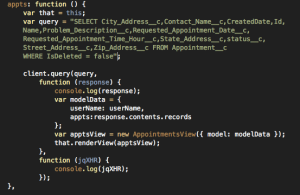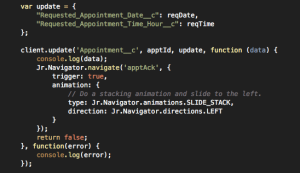It should be no surprise that mobile has revolutionized the way we live and work. We can check-in, tweet, post, and follow just about anything with the swipe or tap of our finger.
Most recently there has been a resurgence of popularity around JavaScript – fueled by lightweight, mobile, responsive apps, and leading frameworks such as Bootstrap, Backbone.js, AngularJS, jQuery Mobile. Developers are building consumer mobile apps in a completely new way.
However, when you look at business mobile apps, the story is a little different.
Business mobile apps are often written in silos – disconnected from customer data and employees. The result is throw-away apps that don’t engage the customer, or add long term value to the business.
In the rare occasions where mobile apps were connected to the business, developers were forced to spend months wiring up backend systems with complicated and time-intensive integration logic. Further, organizations struggled to find any specialized mobile developers resources to help deliver apps as fast as the business needs: Corporate IT doesn’t have an army of native mobile developers, and Agencies, who specialize in mobile app development, don’t understand working work corporate data. The result is expensive, complicated, disconnected apps.
So what is the solution?
I am super excited to announce the availability for two new mobile services for the Salesforce Platform, specifically designed to solve this problem of disconnected mobile apps:
1. Developer Mobile Packs
The Developer Mobile Packs are a series of open source code projects, hosted on GitHub, that use the most popular JavaScript frameworks including Backbone.js, AngularJS, and jQuery Mobile to connect with customer data in Salesforce. Simply write your code in JavaScript, and use the Salesforce Platform Mobile Services to do the heavy lifting of authentication, identity, and business services.
If you know JavaScript you can now write business mobile apps!
For example, let’s say I use Backbone.js, I can query the mobile services with a few lines of JavaScript, and bind it to a model on the client-side:
Then make a few changes, and update the record in real-time:
2. Mobile SDK 2.0
The Mobile SDK 2.0 release, available in June, is a significant update to the popular SDK for developing hybrid and native apps for iOS and Android. We have focused on the following improvements:
a) New entity framework for working with Salesforce data directly from within JavaScript
b) Enhanced SmartStore functionality leveraging SQLCipher to securely store sensitive data for disconnected devices
c) A lightweight, modular design to make it easier than ever to build new, or existing native apps, and connect them to your customer data.
How Do You Get Started?
Check out the new mobile services site for a complete rundown grab the code from github, look through sample applications, and get coding! You can also join the Salesforce developer community in 35+ cities around the globe on April 22-27, 2013 for the Salesforce Mobile Developer Week, and be part of the connected app mobile revolution!



